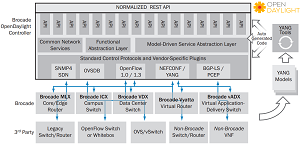News
Brocade Announces SDN Controller Based on Open Source OpenDaylight Code
Brocade Communications Systems Inc. today announced an upcoming software-defined networking (SDN) controller wholly based on the open source OpenDaylight project.
The Brocade Vyatta Controller is the first commercial product built directly with OpenDaylight source code without any added proprietary extensions or platform dependencies, the company claimed.
The OpenDaylight project is an initiative backed by major networking industry players to establish a reference framework for an open platform to provide network programmability and control via SDN and network functions virtualization (NFV). Brocade was a founding platinum member of the consortium, founded in April 2013 and hosted by The Linux Foundation, and has been active in development efforts.
With its commercial product, Brocade is ensuring a "quality assured" edition of the continuously developed OpenDaylight controller, backed by the company's technical support. Emphasizing a smooth, low-risk on-ramp to SDN adoption, Brocade said its approach lets companies get started gradually with the new technology, rather than ripping out existing infrastructure and replacing it with SDN-compatible equipment.
Instead, the Vyatta controller can be deployed as a virtual machine (VM) running on major hypervisors, letting companies incrementally move workloads running on existing traditional systems into their SDN environments.
 [Click on image for larger view.]The Brocade Vyatta Controller will operate on any type of OpenDaylight-compatible
network infrastructure.
[Click on image for larger view.]The Brocade Vyatta Controller will operate on any type of OpenDaylight-compatible
network infrastructure.
(source: Brocade Communications Systems Inc.)
The commercial offering includes a GUI with installation tools and developer support, with pre-tested packages and services specialized for different needs or operations, the company said. It will work with several of Brocade's products and equipment from popular third-party vendors, operating on any OpenDaylight-compatible network infrastructure.
"Users can freely optimize their network infrastructure to match the needs of their workloads, and develop network applications that can be run on any OpenDaylight-based controller," Brocade said.
The company will itself provide some initial applications, such as a Path Explorer that will ship with the first Vyatta release in November. The Path Explorer provides topology awareness and optimization of network traffic paths.
Another application, the Volumetric Traffic Management tool, is expected to ship early next year to help companies manage "volumetric traffic attacks," along with legitimate "elephant flows" in datacenters.
Along with security against distributed denial-of-service (DDoS) attacks, Brocade said other use cases that companies can leverage include bandwidth calendaring, context-aware policy enforcement, prioritization of Unified Communication traffic and advanced network programmability of systems comprising different NFV components.
The company said it plans on developing more apps, some in conjunction with partners, that will be licensed independently of the Vyatta controller.
"Networking must address the compounding forces of cloud computing, mobile and social, all of which have common characteristics of being on-demand and highly personalized," the company quoted analyst Zeus Kerravala at ZK Research as saying. "The realms of compute and storage have already adapted to these requirements. However, the network remains as static and unresponsive as it was from its original design point in the old world of IP. The Brocade Vyatta Controller is one solution to help the network unlock innovation and adapt to the demand-driven world."
The new Brocade controller stems from the 2012 acquisition of the private company Vyatta, a Belmont, Calif.-based SDN specialist that was known for its software-based network OS. No pricing information was given before the general availability of the product, expected later this year.
About the Author
David Ramel is an editor and writer for Converge360.